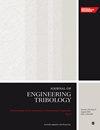Impact of grease physical properties on the friction torque and service life of wheel bearings
IF 1.6
3区 工程技术
Q3 ENGINEERING, MECHANICAL
Proceedings of the Institution of Mechanical Engineers, Part J: Journal of Engineering Tribology
Pub Date : 2024-03-27
DOI:10.1177/13506501241240020
引用次数: 0
Abstract
Wheel bearings play a crucial role in ensuring the smooth and reliable rotation of wheels in automotive applications. Grease is commonly used as a lubricant in wheel bearings. The physical properties of grease, such as viscosity, base oil type, and thickener composition, significantly influence the overall performance and longevity of wheel bearings. This study investigates the impact of grease's physical properties on wheel bearing friction torque and service life. To evaluate the effects of different grease formulations, a series of experiments were conducted using a four-ball tester, rheometer, and a custom-built test rig to measure bearing frictional torque and service life. Multiple greases with varying viscosity grades, base oil types (mineral oil, synthetic oil), and thickener compositions (lithium, diurea, and polyurea) were tested under controlled operating conditions. Friction torque measurements were obtained using a high-accuracy torque sensor, while service life was determined by monitoring the bearing life in actual endurance testing. The results indicated that grease physical properties directly affected wheel bearing friction torque and service life. Low to Medium-viscosity greases generally exhibited 35–40% lower friction torque due to enhanced lubrication film formation and reduced metal-to-metal contact however, excessively high viscosity resulted in 50–60% higher frictional torque and thereby increased energy consumption. Different base oil types showed varying friction reduction and service life level, with mineral oil in some cases showed lower frictional torque around 30–40% particularly at high temperature but with significant reduction in the service life. Furthermore, the thickener composition significantly influenced grease performance. Based on these findings, selecting the appropriate grease with optimal physical properties is crucial for minimizing friction torque and extending the service life of wheel bearings.润滑脂的物理特性对轮毂轴承摩擦扭矩和使用寿命的影响
在汽车应用中,轮毂轴承在确保车轮平稳可靠地转动方面发挥着至关重要的作用。润滑脂通常用作轮毂轴承的润滑剂。润滑脂的物理特性(如粘度、基础油类型和稠化剂成分)对轮毂轴承的整体性能和使用寿命有很大影响。本研究调查了润滑脂的物理特性对轮毂轴承摩擦扭矩和使用寿命的影响。为了评估不同润滑脂配方的影响,研究人员使用四球测试仪、流变仪和定制测试台进行了一系列实验,以测量轴承摩擦扭矩和使用寿命。在受控操作条件下,对粘度等级、基础油类型(矿物油、合成油)和稠化剂成分(锂、缩二脲和聚脲)各不相同的多种润滑脂进行了测试。摩擦扭矩的测量是通过高精度扭矩传感器获得的,而使用寿命则是通过监测实际耐久性测试中轴承的寿命来确定的。结果表明,润滑脂的物理特性会直接影响轮毂轴承的摩擦扭矩和使用寿命。低粘度和中粘度润滑脂由于增强了润滑膜的形成,减少了金属与金属之间的接触,因此摩擦扭矩一般会降低 35-40%,但过高的粘度会导致摩擦扭矩增加 50-60%,从而增加能耗。不同类型的基础油显示出不同的摩擦降低率和使用寿命水平,在某些情况下,矿物油的摩擦扭矩降低了约 30-40%,尤其是在高温条件下,但使用寿命却显著缩短。此外,稠化剂成分对润滑脂的性能也有很大影响。基于这些研究结果,选择具有最佳物理特性的合适润滑脂对于最大限度地降低摩擦扭矩和延长轮毂轴承的使用寿命至关重要。
本文章由计算机程序翻译,如有差异,请以英文原文为准。
求助全文
约1分钟内获得全文
求助全文
来源期刊

CiteScore
4.20
自引率
5.00%
发文量
110
审稿时长
6.1 months
期刊介绍:
The Journal of Engineering Tribology publishes high-quality, peer-reviewed papers from academia and industry worldwide on the engineering science associated with tribology and its applications.
"I am proud to say that I have been part of the tribology research community for almost 20 years. That community has always seemed to me to be highly active, progressive, and closely knit. The conferences are well attended and are characterised by a warmth and friendliness that transcends national boundaries. I see Part J as being an important part of that community, giving us an outlet to publish and promote our scholarly activities. I very much look forward to my term of office as editor of your Journal. I hope you will continue to submit papers, help out with reviewing, and most importantly to read and talk about the work you will find there." Professor Rob Dwyer-Joyce, Sheffield University, UK
This journal is a member of the Committee on Publication Ethics (COPE).
 求助内容:
求助内容: 应助结果提醒方式:
应助结果提醒方式:


